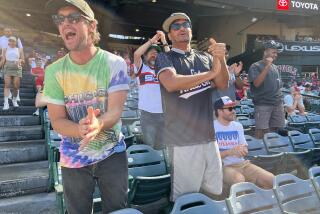A Time of Mourning for the Church of Baseball : Myth: Marge Schott’s slurs are another sign of the national pasttime’s growing apostasy. Can the faith of a believer survive these troubled times?
- Share via
NEW YORK — Call it an image problem.
This week the solons of major-league baseball meet in Louisville, Ky., to determine the fate of Cincin nati Reds’ owner Marge Schott, who has been accused of using racial and religious epithets and keeping a Nazi armband as a souvenir.
The Schott affair is already a public-relations disaster for baseball. But for those of us who love the game, it is far more than a public-relations gaffe. It is the latest in a lengthening string of apostasies threatening to destroy baseball where it lives--not on the playing field or in the executive offices or on TV, but in the rich burnish of myth.
Anyone who follows baseball even nominally knows it is in deep, deep trouble. The quality of play seems to keep declining while ticket prices keep rising--and expansion will only further dilute the talent pool. Fans feel that players are overpaid and owners are self-interested--both betraying the trust that is baseball. The Chicago Cubs selfishly refuse to change divisions, and baseball cravenly caves in. George Steinbrenner III is banished for life, then welcomed back. After falling off the wagon seven times, relief pitcher Steve Howe is reinstated. Labor troubles loom. Francis T. (Fay) Vincent Jr., perhaps the last true believer in the baseball hierarchy and a man who put the game’s interests first, is forced out as commissioner.
And now Schott shoots off her mouth. It makes, according to Baseball’s Boswell, Roger Angell, for “the most apprehensive and unoptimistic baseball off-season anyone can remember.”
But while the game’s woes have been multiplying over the last few years, there has arisen, almost as a form of denial, a passionate romance for baseball in the abstract--a fervid belief that in this game resides a beauty, a truth, a poetry, an Americanness of spirit and values. One might call it the Platonic form of baseball or the Church of Baseball, because it floats above the particulars of the game in a state of exalted holiness.
Baseball is exempt from antitrust laws on the grounds that it is a game, not a business, and, in a sense, baseball has always been exempt from social tumult, even from its own tumult. Yes, professional baseball is a product of our culture. No one, except maybe Pete Rose, really thinks it is just nine men, a bat and a ball in pastoral isolation. Baseball has been racist and greedy and contentious as America has been these things. But through it all, the Church of Baseball has remained inviolate--far larger and far better than the game being played.
We wanted it that way. The Church of Baseball emerged with the game itself at a time when Americans needed myths that could idealize American values and purvey a uniquely American identity. Babe Ruth, Ty Cobb, Christy Mathewson, Joe DiMaggio, later Mickey Mantle, Willie Mays and Sandy Koufax ascended directly from the playing field to the Heavens, from the game to myth.
And over the years, regardless of what was happening on or off the field, that myth was carefully tended by the baseball Establishment and sports’ journalists. They understood baseball was our collective memory and shared passion. It was a trust. It had to be kept pure.
The tending of the myth of baseball was an acknowledgment that churches exist on faith and legitimacy. The Church of Baseball has survived on the faith of die-hard fans in baseball’s splendid transcendence, and it has derived its legitimacy from our own mythic sense of the game. Without our faith and without its legitimacy, the Church of Baseball falls and the game crumbles. It becomes just another sport, another way to kill time.
Which brings me back to Schott. She alone certainly hasn’t threatened the Church of Baseball, no matter what she has done to the image of the major leagues. But taken together with all the other mistakes, revelations and idiocies of baseball over the last few years, especially the ouster of Pope Vincent, Schott’s alleged remarks do something I always thought inconceivable: They erode our confidence in the church.
In part, it is a matter of numbers. There has been just too much bad stuff going on not to make one wonder whether a church can still exist over the game. And, in part, it is a matter of apostasy. The high priests of the game--the players, owners and even journalists--seem now to be unbelievers. They no longer tend the myth because they no longer seem to realize that the game needs the myth to survive. You almost feel they all have to be driven from the temple, not just Schott, until you realize they are the game, and to drive them out leaves the temple empty.
It used to be that the spiritual side of baseball, the church, would always redeem the temporal side. Now the temporal side sullies the spiritual side, and the myth recedes into nostalgia. Schott and the others will have to answer for that. They will have to answer for the destruction of the Church of Baseball.
More to Read
Go beyond the scoreboard
Get the latest on L.A.'s teams in the daily Sports Report newsletter.
You may occasionally receive promotional content from the Los Angeles Times.










